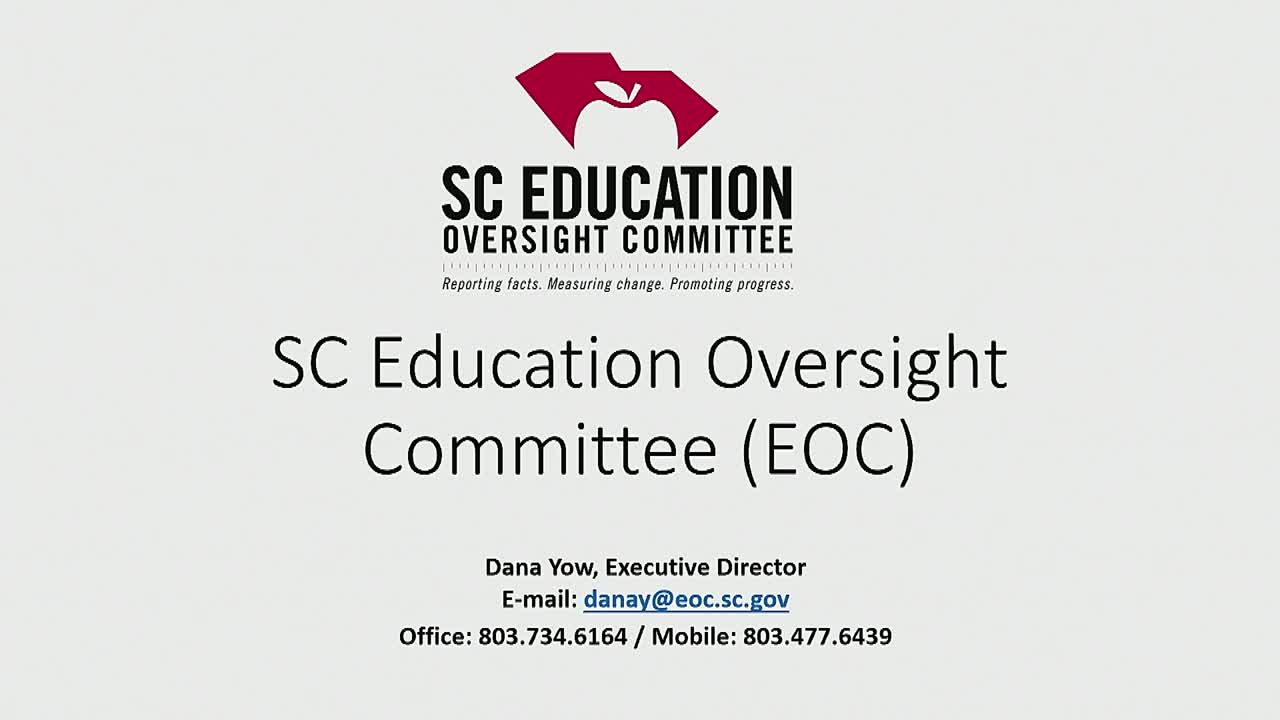Education Oversight Committee: 85.4% on-time graduation, but officials warn of readiness gap
Get AI-powered insights, summaries, and transcripts
Subscribe
Summary
The Education Oversight Committee told the House Education and Public Works Committee that South Carolina’s 2024 on‑time high school graduation rate was 85.4 percent, while a notably smaller share of those graduates meet the state’s college‑ or career‑readiness measures.
The Education Oversight Committee told the House Education and Public Works Committee that South Carolina’s 2024 on‑time high school graduation rate was 85.4 percent, while a notably smaller share of those graduates meet the state’s college‑ or career‑readiness measures.
The presentation, delivered by Dana Yao, executive director of the Education Oversight Committee (EOC), summarized the EOC’s role: approving content standards and statewide assessments used for accountability, producing the annual K‑12 report cards that are issued each year by October 15, evaluating state‑funded programs and producing public data dashboards. "We approve the content standards and the statewide assessments for the big 4," Yao said, naming English language arts, math, science and social studies as the assessments the EOC oversees.
Why it matters: committee members pressed Yao on what the graduation and readiness figures mean for workforce and postsecondary preparation. Representative Paul Bradley asked whether the figures show a systemic problem, saying, “So what in the hell are we doing wrong in South Carolina?” Yao and other members said the committee’s work focuses on tightening the link between a high school diploma and a credential of value so graduates enter college or the workforce prepared.
Key findings and work cited by the EOC
- Graduation and readiness: Yao reported a 2024 on‑time graduation rate of 85.4 percent and showed a smaller share of those same students meeting the EOC’s definition of college‑ or career‑ready (the presentation showed a lower percentage for college/career readiness than for graduation). Yao said college readiness is measured by tests such as ACT/SAT and by completion of rigorous coursework; career readiness is measured by state career‑readiness assessments, industry certifications and similar measures.
- Program evaluations: the EOC performs annual evaluations of state‑funded programs it is charged to study, including the full‑day 4K program and the Educational Credit for Exceptional Needs program. Yao told the committee the EOC’s evaluations so far indicate the full‑day 4K program "does work for 4 year olds." The EOC also produces evaluations of the teacher loan program and of military‑connected students.
- Rural recruitment: the EOC evaluated a rural recruitment initiative funded by EIA (Education Improvement Act) dollars; Yao said the state currently invests about $7,600,000 in rural recruitment incentives and that districts may choose from a menu of roughly 15 incentives (mentoring/induction, housing incentives, recruitment fairs, international teacher incentives and others). The EOC examined return on investment and retention effects of the different incentives.
- Chronic absenteeism: Yao identified chronic absenteeism as a major driver of achievement gaps and said the EOC’s dashboards let users drill down by school and community. The committee was told the EOC recently completed focus groups with students and parents on attendance and is beginning to analyze parent feedback.
Committee discussion and follow up
- Retention and remediation: members debated retention policies and remediation strategies. Representative Tipple and others asked about turnover and the effectiveness of retention when it is implemented without intensive, high‑quality interventions. Yao and committee members said retention without a change in instruction is unlikely to help, but retention with targeted, higher‑quality intervention and summer programs can improve outcomes.
- Data and resources promised: Yao said the EOC will provide slides and additional data to the committee, including the EOC’s annual EIA recommendations and the education dashboards available at dashboardsc.sc.gov. The EOC has eight full‑time staff and conducts cyclical reviews of the accountability system this year.
The presentation concluded with an invitation for committee members to request deeper dives or individual briefings; Yao said the EOC can provide the committee with the evaluations and the detailed dashboards discussed during the meeting.
